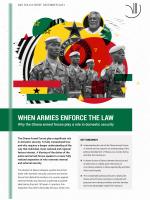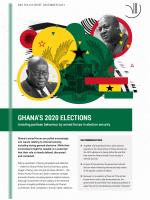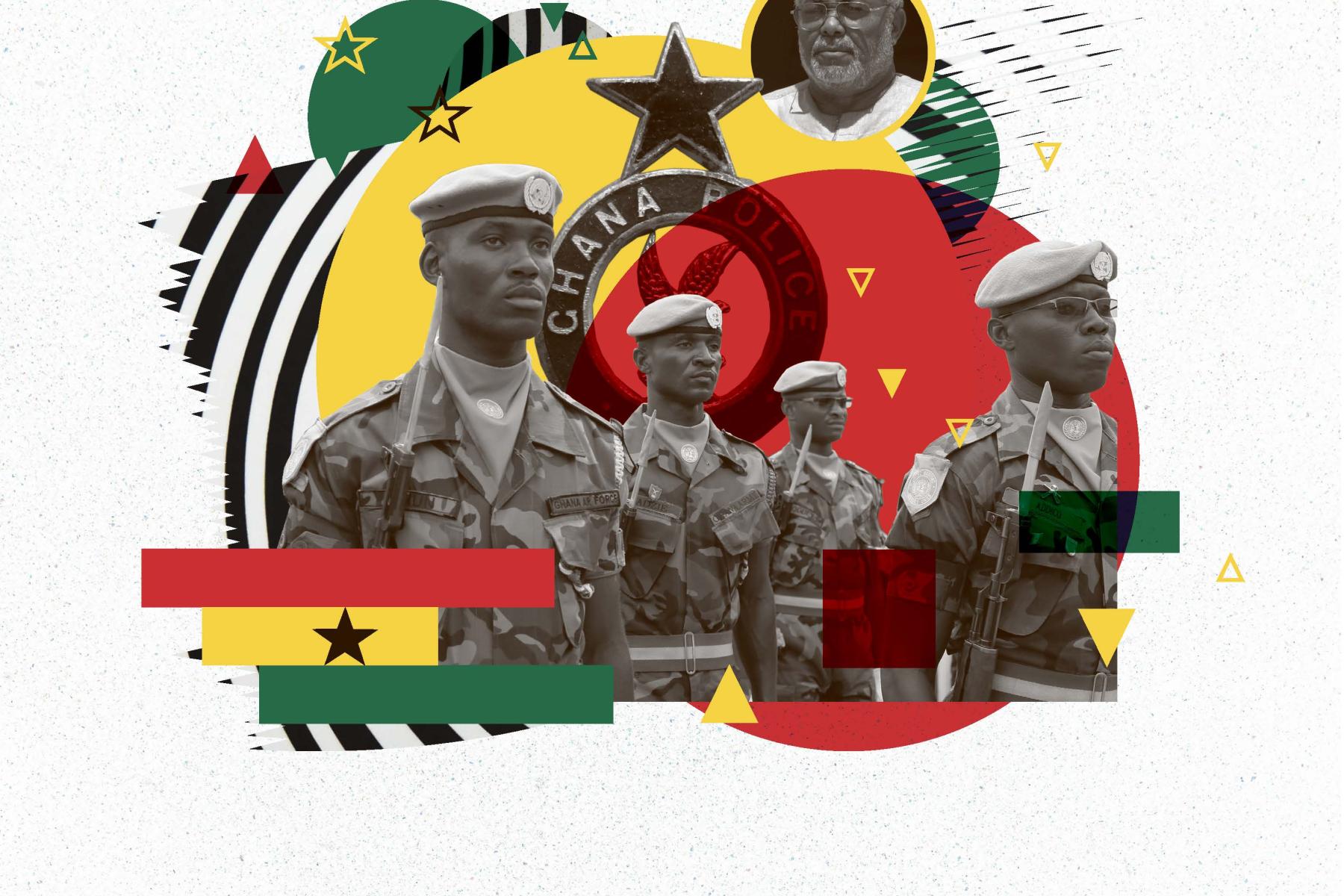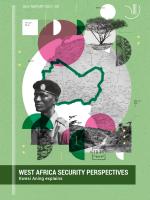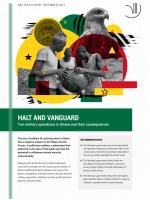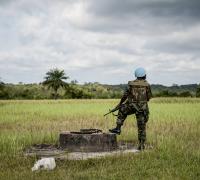Halt and Vanguard

- The Ghanaian government and civil society should use Operation Vanguard and Operation Halt to start a discussion on the limits of political involvement in the security sector, especially the armed forces.
- The Ghanaian government should clarify the boundaries of military involvement in domestic security, being mindful of overall militarisation of security in the country.
- The Ghanaian government should be more explicit about whether there is a ‘Ghana model’ for using the military in a positive way for internal security.
The use of soldiers for policing roles in Ghana has a negative impact on the Ghana Armed Forces. It politicises soldiers, undermines their authority in the eyes of the public and has the potential to militarise internal security unnecessarily.
Deploying the armed forces to enforce domestic security is normally met with caution and criticism. It defies traditional divisions between the roles of the police, mandated to maintain internal security, and the military, expected to defend a country and its interests against external threats.
When the military is used for domestic purposes, it leads to what is often seen as dangerous militarisation and escalation of violent law enforcement. In Nigeria, observers make the link between the military’s deployment to manage internal conflicts and human rights violations. Likewise, Brazil’s growing reliance on soldiers for public security purposes has proven increasingly irreconcilable with rule of law principles.
Since the early 1990s, the Ghana Armed Forces have played an increasingly central role in addressing a wide range of internal security concerns, from chieftaincy disputes and armed robberies to illegal mining and logging. As a consequence, concerns are rising about the militarisation of internal security in Ghana, and equally importantly, the implications of political interference from and direction by the executive.
Politicians that task the military to carry out policing functions stretch soldiers into roles that they are neither trained for, nor fully equipped to perform. The examples of Operation Vanguard and Operation Halt, deployed to deal with illegal mining and logging respectively, provide insight into how these dynamics play out in practice.
Operation Vanguard and illegal mining
Vanguard was launched in mid-2017 as a joint military-police operation to end galamsey, a Ghanaian term derived from the phrase ‘gather them and sell’ which refers to illegal small-scale mining. Unusually for an internal operation, Vanguard was led by the military rather than the police.
A ‘joint taskforce’ was formed of 200 military and 200 police personnel in order to stop galamsey and in doing so prevent the degradation of forests and pollution of waterbodies. In practice this was meant to involve the seizure and burning of equipment belonging to illegal mining operators and the forced closure of mines without official paperwork.
In 2018, the Minister of Lands and Natural Resources emphasised the successes of Vanguard, boasting the number of excavators confiscated (90% at galamsey sites), and the arrest of 347 people who were mining illegally (most of the seized equipment was later reported to be missing by the minister). Vanguard was also connected to the identification of potential terrorists coming from across coastal West Africa and the Sahel to make a living mining gold in Ghana.
With time, the populace has come to realise the military is more effective when it comes to these internal issues, even when they can be handled by the police.
In March 2020, the military was abruptly withdrawn from Vanguard only to be reinstated equally abruptly in late April 2021. The erratic nature of decision-making around Vanguard indicates not only the considerable challenge that galamsey represents, but also the substantial political interests that are at stake.
Among politicians there has been resistance to Vanguard because many of them are involved in galamsey directly or indirectly. In addition, miners constitute a substantial pool of voters, with 200,000 Ghanaian miners indirectly supporting up to three million people.
Moreover, media reports suggest that military personnel have been involved in providing security for rent for illegal mining operations, effectively functioning as a private security company. Indeed, one senior police officer, serving in a leadership role within Vanguard, indicated: “They [the military] were protecting the miners, diverting us [the police] to the wrong places.”
In turn, one military officer noted: “In the military, we are afraid of where the police got to.” The Ghana Police Service are seen as corrupt and politicised in the eyes of the public – and to a large extent ineffective. There are fears within the armed forces that operations like Vanguard are leading them down the same path.
Operation Halt and the destruction of forest reserves
Operation Halt was established to end the illegal exploitation of another natural resource, timber, especially in Brong-Ahafo and Western Region, and the unrestrained destruction of forest reserves because of illegal mining, farming and lumbering. Between 2017 and 2018, deforestation of Ghana’s primary forests jumped 60% – the highest percentage of any tropical country.
Unlike Vanguard, Halt is civilian led, but by the Forestry Commission rather than the Ghana Police Service. Halt was established with military personnel involved, because police officers and members of the Forestry Commission were being threatened, sometimes killed, when trying to protect the remaining forest from further degradation and thereby threatening people’s livelihood.
We are losing the bite we had, because of our involvement in almost everything, as the frontliners rather than behind in support.
The neutral stabilising security role that the Ghana Armed Forces are expected to play during internal operations has been undermined during Halt. This is due to two related factors: the forces’ narrow room to manoeuvre within Halt; and a chain of command where the armed forces de facto are accountable to the Forest Commission’s representative (the technical officer). Military personnel only have a mandate to respond to a situation if they are requested to do so by the technical officer, as they are not vested with the authority to check the paperwork of loggers and miners.
Soldiers will confiscate machinery at the request of the technical officer and escort it to the office of the Forest Commission. However, often irregular deals are struck between the technical officer and the logger or miner, which makes the armed forces personnel appear biased and undercut their authority.
This is also the case when the military is deployed to deal with some illegal loggers and not others. For instance, loggers that are considered foreign to a particular area might be targeted, while others who do not have official paperwork are left alone to work.
Ghana’s news outlets report far less on Halt than on Vanguard (one reason is the size of Ghana’s mining industry, making up 37% of Ghana’s total exports, but also the violence in many galamsey areas). However, Halt is equally chipping away at the image of the Ghana Armed Force’s incorruptibility and neutral security role in comparison to other Ghanaian security institutions. If public respect descends, and the neutrality of the military is blurred, the possibility of confrontation with the public increases. This, in effect, is tantamount to the potential militarisation of internal security in Ghana.
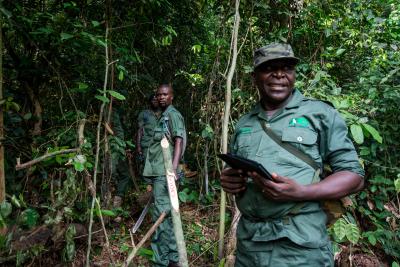
Undermining military authority? Militarising security? Both?
Even if policies such as Military Aid to the Civil Authorities are in place precisely to support civilian authorities when the police are overwhelmed, military personnel are not trained specifically to carry out law enforcement duties.
The public debate is limited on whether the overuse – some would argue misuse – of military equipment and tactics to enforce the law will lead to increasing levels of state-sanctioned violence in Ghana. It is doubtful whether a conscious decision has been made by the government on where the tipping point is between acceptable and unacceptable military involvement in internal security, and when it starts to have a destabilising effect on the country as a whole.
Of equal concern is the potentially demoralising effect that the military’s regular involvement in domestic security has on the Ghana Armed Forces as an organisation. In the case of Vanguard, military personnel have entered a space where they are colluding with illegal miners, including letting their services as security personnel – and symbols of state representation – out for hire.
In doing so, the status of the Ghana Armed Forces is inching towards that of the Ghana Police Service which is not seen as neutral and efficient and suffering from direct and publicly known political interference. Appearing neutral is equally compromised in the case of Halt, due to the Forest Commission’s handling of illegal logging, where it often strikes deals with the loggers rather than taking them to court.
It makes the Ghana Armed Forces appear biased and frustrates individual soldiers because, while they may witness what they consider to be illegal offences, they are unable to act on them.
Looking across West Africa, including Ghana, the separation of armies and executives has never been a given. Military coups have taken place numerous times and politicians have often used militaries to address domestic security issues.
One could argue that the Ghanaian model – i.e. that the armed forces have a central role to play in internal operations – works, as everyday security has not been overly militarised in the country. Nevertheless, it does reflect that the police are weak and unable to play the role that is expected of them.
Militarisation is not the only concern at stake. Diverting the armed forces from their constitutional role of defending Ghana’s borders is not only taxing on resources, but it also weakens the authority of soldiers, opening them up to criticism of corruption, which in the long run will weaken the military organisation as a last resort security institution.
This policy brief is an output from the research programme Domestic Security Implications of Peacekeeping in Ghana (D-SIP), funded by the Danish Ministry of Foreign Affairs and supported by the Danish Fellowship Centre.
DIIS Eksperter

